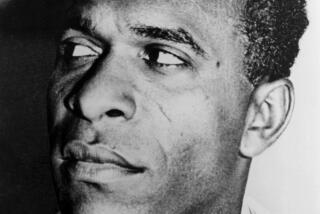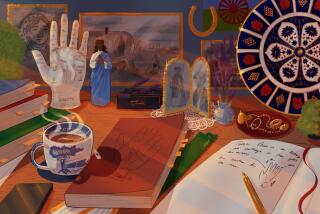The Sorrows and Secrets of Mircea...
- Share via
Author of scores of learned books and articles; prolific journalist, novelist and short-story writer; founder of two academic journals; editor of the “Encyclopedia of Religion”; cultural, political and religious visionary in his native Romania; celebrated professor at the University of Chicago; the most influential voice in the study of religion in the United States--and perhaps the world--for at least a generation, Mircea Eliade died in 1986 at age 79. Because he insisted on the reality of humanity’s experience of the transcendent, Eliade rubbed against the grain of secular sensibilities. This gentle man affirmed those often revolutionary claims of great prophets and mystics: “History” was conditioned by the non-historic; meaningless everyday time was awash in a timeless time of cosmic significance. A historian of religion, he studied historical claims of encounters beyond history; in doing so, he tried to make the sacred real in an age that he believed suppressed it. A novelist, he sought to evoke this saving sense of the sacred by mastery of a literary art that hid eternity behind the mask of mere becoming, offering itself to those blessed with eyes willing to see.
In normal times, Eliade’s achievements would be judged remarkable. But in Eliade’s “Autobiography” we learn the miraculous ways they were won against scarcely imaginable hardships visited by the “terror of history”--the wartime slaughter of countless loved ones, perilous political persecution and internment, the cancer death of his first wife, refugee flight and resettlement, followed by years of chronic, humiliating poverty, and sometimes just palpable physical hunger. But discovered behind the profanity of these evils is the regular grace of loving friends--the offer of small academic jobs, rent money, membership in the charmed circle of a learned society, or just a simple place to work.
Sometimes Eliade even sees cosmic providence in the disruptions that have plagued his life. In 1940, Hitler’s Rohmputsch was replayed in Bucharest. Gen. Antonescu’s “party of order,” the fascist National Legionary State, triumphed and forced Eliade and other more “spiritual” radicals associated with Codreanu’s adventurist Legion of the Archangel Michael, off the high road of history. Codreanu’s right-wing political and religious revolution, defended to our day by Eliade in his autobiography, was effectively liquidated. Many legionnaires were killed; others, like Eliade, whether overt members or mere suspects, were imprisoned. Yet getting thrown off the Romanian political track only spurred Eliade to universalize his revolutionary ambitions. On the plane of international academic life, Eliade became a kind of prophet of the trans-historical, hiding within historical documents. A true cultural revolutionary to the end, Eliade challenged the whole secular bourgeois world’s comforting belief in the adequacy of its own works of science, politics and economics.
But, worthy ambition or not, Eliade decided to shut us out of his 1930s mind. Eliade’s account of his (at least) profound sympathy for the political and cultural revolution of Codreanu’s Legion is rife with equivocation, leaving us ignorant of the meaning of this vital phase of his life. Eliade persistently distinguishes Codreanu’s Legion from so-called “political” movements; the Iron Guard is “ethical and religious.” Yet Eliade must know that for Codreanu’s Legion, the distinction between “politics” and “religion” is one without a difference.
Eliade tells us of the legion’s electoral triumphs. Not “political?” Likewise Eliade confounds the balance of historical judgment by representing the latter-day Iron Guard as embarked on “the path of nonviolence” and as urging “passive resistance.” Yet about the years of the legion’s bully-boy anti-Semitism, Eliade is totally silent. As for his own involvement, Eliade is equally unclear: he refused to dissociate himself from the legion, first because he says he was not a “political man,” but then--confusingly a few pages on--because it was “unacceptable” and “absurd” to do so, because he could not conceive of dissociating himself from the “new generation” while it was being “unjustly” persecuted.
Thus, readers with an eye for history or for certain questions about the precise meaning of Eliade’s political beliefs in the Romania of the 1930s will be left with questions unanswered. Whatever the real truth is about what Eliade calls his “imprudent acts and errors committed in youth,” he has carried them to his grave.
More to Read
Sign up for our Book Club newsletter
Get the latest news, events and more from the Los Angeles Times Book Club, and help us get L.A. reading and talking.
You may occasionally receive promotional content from the Los Angeles Times.







